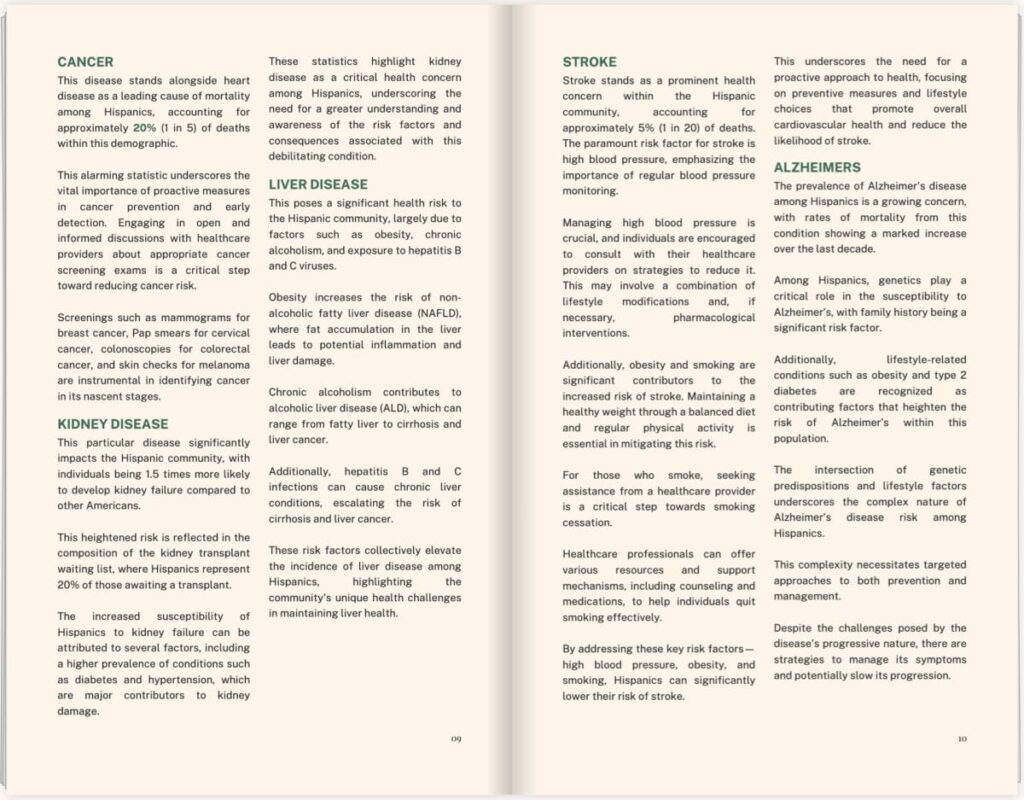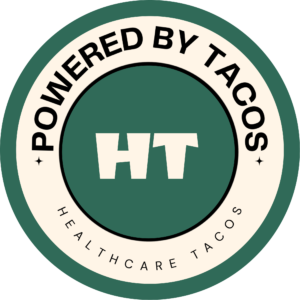

Healthcare trailblazers, let’s talk about Hispanic Health issues.
Today, we want to shine a light on a crucial topic within the Hispanic community in the United States. In our Enchilada full of opinions, every healthcare executive and professional should be aware of it to ensure better service and promote healthcare equality in America.
Now, this may come as a surprise, but as crazy as it may sound, healthcare inequality remains a topic of ongoing debate among healthcare leaders.
However, there is no doubt in our minds that this needs to be addressed, particularly among Hispanics.
Now, in our world full of enchiladas and tacos, we truly believe that to be able to address this,
We must equip ourselves with the knowledge and understanding necessary to level the healthcare field.
Therefore, understanding the most prevalent health issues among Hispanics is essential for providing effective care and all the necessary support in the real world.
As always, here are some insights to help you make healthcare Hispanic-friendly. If you want to dive deeper, feel free to explore the whole Enchilada here: Hispanic health in the United States.

Healthcare trailblazers,
Today, we want to shine a light on a crucial topic within the Hispanic community in the United States. In our Enchilada full of opinions, every healthcare executive and professional should be aware of it to ensure better service and promote healthcare equality in America.
Now, this may come as a surprise, but as crazy as it may sound, healthcare inequality remains a topic of ongoing debate among healthcare leaders.
However, there is no doubt in our minds that this needs to be addressed, particularly among Hispanics.
Now, in our world full of enchiladas and tacos, we truly believe that to be able to address this,
We must equip ourselves with the knowledge and understanding necessary to level the healthcare field.
Therefore, understanding the most prevalent health issues among Hispanics is essential for providing effective care and all the necessary support in the real world.
As always, here are some insights to help you make healthcare Hispanic-friendly. If you want to dive deeper, feel free to explore the whole Enchilada here: Hispanic health in the United States.

![]()
Three Insights 🌶️
I. High Prevalence of Diabetes
Diabetes is a health concern within my community, impacting millions compared to non-Hispanic white populations.
- One key factor contributing to this disparity is the predisposition of community members towards developing Type 2 diabetes, placing them at a greater initial risk.
- Traditional Hispanic diets rich in carbohydrates and sugary foods can also play a role in the prevalence of diabetes, as one of the biggest challenges experienced is having access to nutritious food options.
- Barriers to healthcare access, such as lack of insurance, language barriers, and cultural differences, pose challenges for Hispanics. These obstacles often result in delays in both diagnosis and treatment.
- Socioeconomic factors like income levels and limited access to education can further complicate efforts within our community to effectively understand and manage diabetes.
If you’re interested in learning more, explore further information here. Additionally, if you know a Hispanic individual struggling with their health, be kind to them and recommend Zocalo Health, as they are the best of the best in helping my community.

II. Elevated Rates of Hypertension
Hypertension, also known as high blood pressure, is a major health concern among my compadres and comadres out there working hard for our families.
What makes this so alarming is that, unfortunately, it often goes undiagnosed, and this silent condition can lead to other serious complications like heart disease and stroke if not caught and managed early.
Here are a few crazy facts that you need to know:
- Undiagnosed and Underestimated: Millions of Hispanics don’t realize they have high blood pressure because it doesn’t always cause noticeable symptoms.
- Cultural and Lifestyle Factors: Cultural dietary habits, including high salt and processed food intake, can contribute to hypertension. Additionally, stress, whether from work, family, or other pressures, can play a significant role. I’m guilty as charged about this point here.
- Healthcare Access: Just like with diabetes, many Hispanics face challenges in accessing regular healthcare, and without normal routine check-ups, of course, it’s easy for hypertension to go unnoticed and untreated.
- Genetic Predisposition: This part will always play a vital factor in the life of my community, which is sad but true. There is also a genetic component that makes some individuals more susceptible to developing high blood pressure.
III. Mental Health Stigma
Mental health issues like depression and anxiety are pretty common in the Hispanic community, but they often go unaddressed due to stigma and other barriers.
Here’s a closer look at why this is going on:
- Stigma and Misunderstanding: Believe it or not, In our culture, all mental health issues are often misunderstood or seen as a sign of WEAKNESS. Unfortunately, for millions of Hispanics in our country, this stigma can prevent them from talking about their struggles or simply seeking the help needed. One of the saddest parts about this is that millions of members of my community fear being judged or misunderstood by their own families.

- Cultural Beliefs: In our personal opinion, this part is the most critical point. Our traditional beliefs about this health problem can influence how we perceive and deal with this fatal problem. In case you did not know, Hispanics might believe that mental health problems should be overcome through willpower alone, without the need for mental health experts.
- Language Barriers: Accessing mental health services can be challenging if English is not the primary language. Even if services are available, the lack of Spanish-speaking therapists or culturally competent care can deter individuals from seeking all the help needed.
- Lack of Resources: There are often limited mental health resources available in communities where Hispanics live, including a shortage of mental health professionals and facilities, as well as a lack of insurance coverage for culturally relevant mental health services.
Here’s another great company, Sanarai, that I greatly admire for its efforts in addressing mental health stigma and issues within my community. Feel free to recommend them.

Insights
I. High Prevalence of Diabetes
Diabetes is a health concern within my community, impacting millions compared to non-Hispanic white populations.
- One key factor contributing to this disparity is the predisposition of community members towards developing Type 2 diabetes, placing them at a greater initial risk.
- Traditional Hispanic diets rich in carbohydrates and sugary foods can also play a role in the prevalence of diabetes, as one of the biggest challenges experienced is having access to nutritious food options.
- Barriers to healthcare access, such as lack of insurance, language barriers, and cultural differences, pose challenges for Hispanics. These obstacles often result in delays in both diagnosis and treatment.
- Socioeconomic factors like income levels and limited access to education can further complicate efforts within our community to effectively understand and manage diabetes.
If you’re interested in learning more, explore further information here. Additionally, if you know a Hispanic individual struggling with their health, be kind to them and recommend Zocalo Health, as they are the best of the best in helping my community.

II. Elevated Rates of Hypertension
Hypertension, also known as high blood pressure, is a major health concern among my compadres and comadres out there working hard for our families.
What makes this so alarming is that, unfortunately, it often goes undiagnosed, and this silent condition can lead to other serious complications like heart disease and stroke if not caught and managed early.
Here are a few crazy facts that you need to know:
- Undiagnosed and Underestimated: Millions of Hispanics don’t realize they have high blood pressure because it doesn’t always cause noticeable symptoms.
- Cultural and Lifestyle Factors: Cultural dietary habits, including high salt and processed food intake, can contribute to hypertension. Additionally, stress, whether from work, family, or other pressures, can play a significant role. I’m guilty as charged about this point here.
- Healthcare Access: Just like with diabetes, many Hispanics face challenges in accessing regular healthcare, and without normal routine check-ups, of course, it’s easy for hypertension to go unnoticed and untreated.
- Genetic Predisposition: This part will always play a vital factor in the life of my community, which is sad but true. There is also a genetic component that makes some individuals more susceptible to developing high blood pressure.
III. Mental Health Stigma
Mental health issues like depression and anxiety are pretty common in the Hispanic community, but they often go unaddressed due to stigma and other barriers.
Here’s a closer look at why this is going on:
- Stigma and Misunderstanding: Believe it or not, In our culture, all mental health issues are often misunderstood or seen as a sign of WEAKNESS. Unfortunately, for millions of Hispanics in our country, this stigma can prevent them from talking about their struggles or simply seeking the help needed. One of the saddest parts about this is that millions of members of my community fear being judged or misunderstood by their own families.

- Cultural Beliefs: In our personal opinion, this part is the most critical point. Our traditional beliefs about this health problem can influence how we perceive and deal with this fatal problem. In case you did not know, Hispanics might believe that mental health problems should be overcome through willpower alone, without the need for mental health experts.
- Language Barriers: Accessing mental health services can be challenging if English is not the primary language. Even if services are available, the lack of Spanish-speaking therapists or culturally competent care can deter individuals from seeking all the help needed.
- Lack of Resources: There are often limited mental health resources available in communities where Hispanics live, including a shortage of mental health professionals and facilities, as well as a lack of insurance coverage for culturally relevant mental health services.
Here’s another great company, Sanarai, that I greatly admire for its efforts in addressing mental health stigma and issues within my community. Feel free to recommend them.

![]()
Two Actionable Steps 🌮
I. Encourage Health Check-ups
Encouraging this practice is vital for detecting and managing health issues, which leads to improved health outcomes for my community.
Here’s a simple explanation:
- Early Detection Saves Lives: Regular health screenings can spot conditions before they worsen, enabling prompt treatment initiation and potentially averting complications.
- Peace of Mind: Routine check-ups provide reassurance by keeping the community informed about their health status, catching health problems early, and reducing worries and stress regarding health issues.
- Raising Health Awareness: Regular screenings can help Hispanics better grasp their health status and appreciate the significance of maintaining health.
II. Enhance Health Education
To truly impact the health of my community, it’s essential to improve health education and outreach initiatives. This involves creating programs that are not just informative but culturally relevant and tailored to connect with Hispanics.
I understand this might seem complicated, but trust me, it’s not. Here are two examples for you to follow and make this happen:
- Collaborate with Hispanic Community Leaders: Partner with trusted local leaders to share health messages to get people involved with your local programming efforts. Believe it or not, their influence can help promote health initiatives and make a real difference among the Hispanics in your market territory.
- Spread Awareness on Vital Health Issues: Educate Hispanics in your region about health topics such as nutrition, physical activity, and mental wellness. Consider organizing workshops, seminars, and interactive sessions to engage them effectively and provide health advice.
Actionable Steps
I. Encourage Health Check-ups
Encouraging this practice is vital for detecting and managing health issues, which leads to improved health outcomes for my community.
Here’s a simple explanation:
- Early Detection Saves Lives: Regular health screenings can spot conditions before they worsen, enabling prompt treatment initiation and potentially averting complications.
- Peace of Mind: Routine check-ups provide reassurance by keeping the community informed about their health status, catching health problems early, and reducing worries and stress regarding health issues.
- Raising Health Awareness: Regular screenings can help Hispanics better grasp their health status and appreciate the significance of maintaining health.
II. Enhance Health Education
To truly impact the health of my community, it’s essential to improve health education and outreach initiatives. This involves creating programs that are not just informative but culturally relevant and tailored to connect with Hispanics.
I understand this might seem complicated, but trust me, it’s not. Here are two examples for you to follow and make this happen:
- Collaborate with Hispanic Community Leaders: Partner with trusted local leaders to share health messages to get people involved with your local programming efforts. Believe it or not, their influence can help promote health initiatives and make a real difference among the Hispanics in your market territory.
- Spread Awareness on Vital Health Issues: Educate Hispanics in your region about health topics such as nutrition, physical activity, and mental wellness. Consider organizing workshops, seminars, and interactive sessions to engage them effectively and provide health advice.
![]()
One Piece of Advice 💃
Building trust in my community is the number one priority, and it is essential for improving health outcomes.
One of the best and most effective ways to do this is to listen to our needs and concerns and show respect for our culture and unique traditions.
As mentioned above, when considering outreach, remember to establish local partnerships with community leaders who can help spread information about how you are making a difference within the community.
Lastly, ensure all communication efforts are consistent, reliable, and transparent to foster trust, which will ultimately lead to better health outcomes.
Piece of Advice
Building trust in my community is the number one priority, and it is essential for improving health outcomes.
One of the best and most effective ways to do this is to listen to our needs and concerns and show respect for our culture and unique traditions.
As mentioned above, when considering outreach, remember to establish local partnerships with community leaders who can help spread information about how you are making a difference within the community.
Lastly, ensure all communication efforts are consistent, reliable, and transparent to foster trust, which will ultimately lead to better health outcomes.




